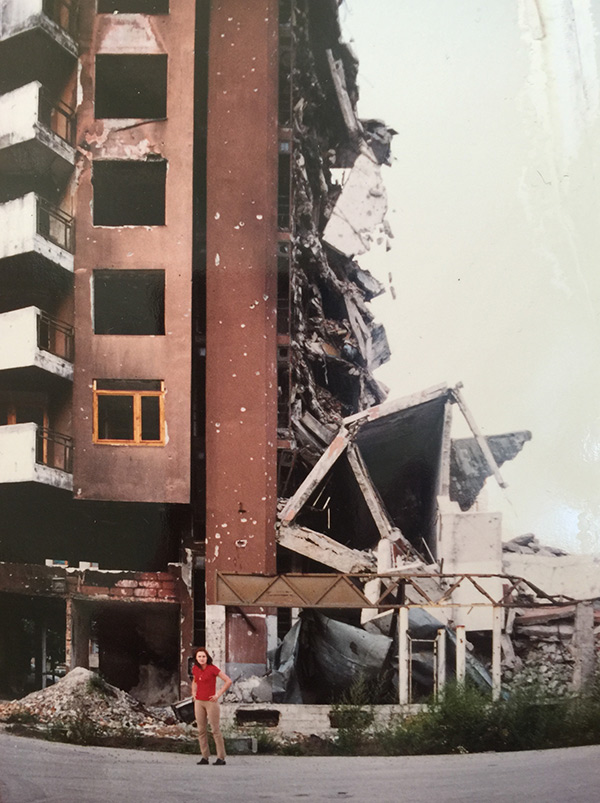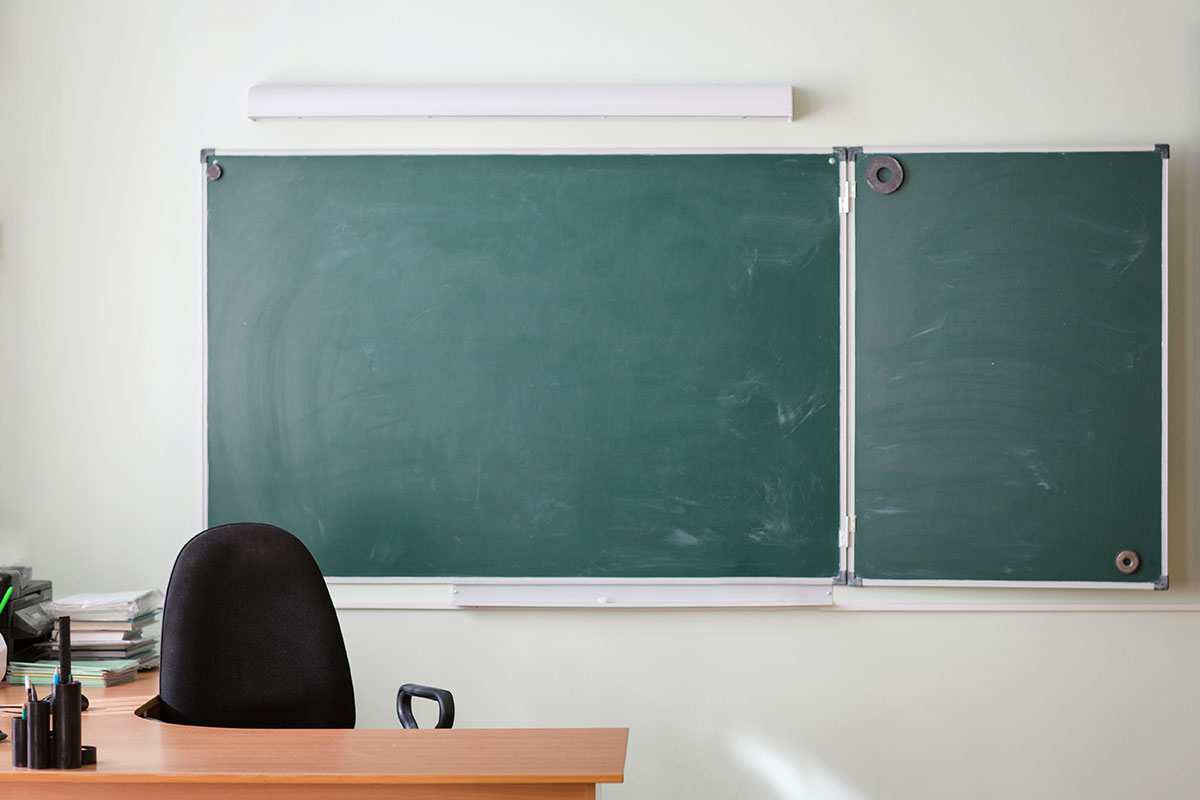With an uncertain new school year upon us, it has never been clearer that schools provide us with critically important services, from imparting knowledge and skills to providing a theater for socialization and friendships, to furnishing meals and health care for many poorer students, to simply giving parents a place to send their children during the workday.
Yet our society continues to under-value and even denigrate the single most precious gift our schools give us: teachers.
COVID & Schools
A series on education during the pandemic
Research has demonstrated the extent to which our communities have devalued teachers relative to other professions and even teaching relative to research. More recently, many voice are arguing that schools’ forced conversion to online learning marks a new era of cyber education, in which teachers are superfluous. Others unfairly blame teachers for the shortcoming of virtual instruction.

VALUING SAFE SPACES As a teenager, Sabic-El-Rayess survived ethnic cleansing in Bosnia as a teen, thanks in great part to the stability her teachers provided. (Photo by Amra Sabic-El-Rayess)
Of course, those of us with access to computers and the internet are completely lucky that technology platforms enable us to both teach and learn from the safety of our homes.
But as both a scholar who studies the radicalization of politically marginalized people and a Bosniak (Bosnian Muslim) who grew up in Bosnia and Herzegovina during the ethnic cleansing of the 1990s, I have seen firsthand just how important direct teacher-student interactions are during dark times like these.
As both a scholar who studies the radicalization of politically marginalized people and a Bosniak (Bosnian Muslim) who grew up in Bosnia and Herzegovina during the ethnic cleansing of the 1990s, I have seen firsthand just how important direct teacher-student interactions are during dark times like these.
Back then, we went long months with no school, because the Serb military sought to exterminate, demoralize and dehumanize us by shelling civilian targets — including schools — to kill as many children as possible. But, when school was held, no one failed to attend, because we treasured those moments — for the distraction from the war, for the chance to see one another, but above all, because of our teachers.
I will always remember my literature teacher walking into a classroom only hours after she had lost her husband and reading, through tears, a poem on love, loss, and forgiveness she had previously assigned to our class. Every word applied to our shared experiences, every expression brought us closer together, and every tear deepened our student-teacher connection. There was an undeniable permanency to that moment’s effect on building our collective resilience and determination. Our teacher, along with others, ensured that what we learned, we also lived.
That memory has become more vivid during the COVID crisis — and especially so since the police killing of George Floyd and the subsequent protests in this country and around the world. It is at precisely such a moment that our children need the intentional relevance of my long-ago teacher, whose love and concern for us outweighed the lack of pencils, textbooks, and nutrition.
It is at precisely such a moment that our children need the intentional relevance of my long-ago teacher, whose love and concern for us outweighed the lack of pencils, textbooks, and nutrition.
That kind of teaching fosters understanding and knowledge — not in a social, political, or emotional vacuum but instead, by doing the messy work of negotiating conflicts and compromises as we incorporate more of our lived experiences into our math, literature, history, and science lessons. As our youth process their experiences of this pandemic and of the public images of racist violence and public protest, we must make our post-COVID19 classrooms into physical “safe spaces” that allow them to confront their traumas, losses, and fears about their futures.
If we fail to do so, particularly at this moment when growing numbers of far left and far right movements are putting forth competing narratives to pull us away from each other, we will witness a continued rise in the marginalization and radicalization of American youth.
Consider a young person who holds a view based on bias against a particular ethnic group or religion. There are ways to address the logic that underlies that bias — but not if the student feels prohibited from expressing it or unwelcome in class to begin with. A few years back, I received a threat from a Columbia alum whom I never met. He did not think a Muslim should be allowed to teach. That same week, I used this individual’s letter in my radicalization course. My students were challenged to decode this person’s path to radicalization by applying theories we had covered in class to a lived moment. It was in that moment that everyone in the class understood how consequential learning can be to our immediate wellbeing. Creating a network of such moments ultimately builds one’s resilience, critical thinking, and adaptability to a changing world.
We need to invest more in our teachers -- in what we pay them, in their professional development, in how we mentor them to counter the racial, religious and ethnic stereotypes in our schools, in the resources we give them, and in how we esteem them for the courageous work they do.
We need to invest more in our teachers to do this kind of work — in what we pay them, in their professional development, in how we mentor them to counter the racial, religious and ethnic stereotypes in our schools, in the resources we give them, and in how we esteem them for the courageous work they do. This also includes investing in and diversifying the teachers who teach teachers — meaning us — because we have the privilege of influencing teaching and education around the world through our own work at one of the most globally renowned schools of education, Teachers College. But, no meaningful change can ever occur without adequate funding. Right now, our elected leaders are slashing school budgets even as many teachers are risking their own health to work in poorly ventilated buildings and/or working longer hours to accommodate online students.
At education schools like Teachers College, we are best equipped to leverage our research-backed expertise and prepare engaged teachers who can simultaneously grapple with youths’ engrained beliefs and their changing emotional and academic needs. We have the interdisciplinary strength to create a fully integrated SEA (social, emotional, and academic) model of learning that strengthens our civic empathy for each other, delivers academic rigor and knowledge through intentional and relevant teaching, and models engaged listening in all of our schools. And we have the policy scholarship and advocacy skills to tilt education away from the testing mania and towards expanding opportunities for discussions and activities that would enthuse youths to act beyond their Twitter activism and achieve beyond a perfect SAT score.
We can’t undo the damage inflicted by the twin pandemics of COVID and racism. But we can make sure that we act on one of the most important lessons they teach us: that it is time to reshape education to meet our children’s deepest needs, and to restore the primacy of teachers, our schools’ and society’s greatest asset.
Amra Sabic-El-Rayess is Associate Professor of Practice in Teachers College’s Department of Education Policy & Social Analysis. She is the author of the critically acclaimed memoir The Cat I Never Named: A True Story of Love, War, and Survival (Bloomsbury, 2020). To purchase Professor Sabic-El-Rayess’ book, please visit: https://www.goodreads.com/book/show/49127643-the-cat-i-never-named
